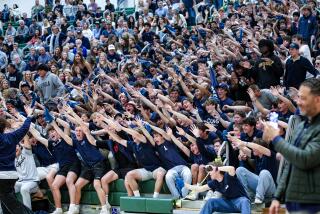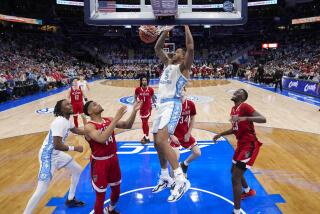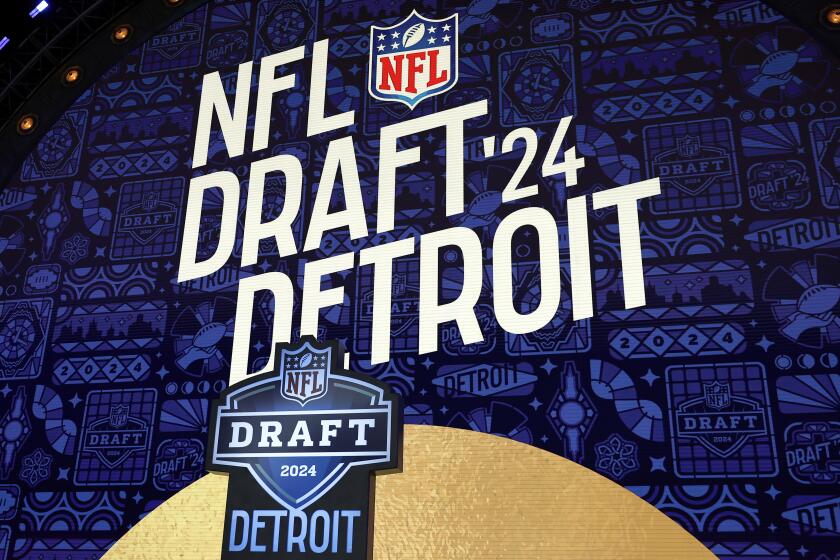Commentary: Loyola Chicago helps make sense of March Madness during a scandal-plagued season
Earlier this week, the police escort didn’t show up at Loyola Chicago’s team hotel in Atlanta.
Coach Porter Moser had no idea how to get to Philips Arena. Neither did the team’s bus driver.
Loyola eventually found its way to the arena for practice the day before the Sweet 16, almost an hour behind schedule.
“Our guys handled it a lot better than me,” Moser told reporters. “I guess my immaturity came out.”
The would-be escort is about the only thing that hasn’t gone right for the 11th-seeded Ramblers during their improbable run to Saturday’s Elite Eight game against ninth-seeded Kansas State.
In a season when the ongoing federal investigation into bribery and corruption in college basketball has seemed to hang over every game, Loyola’s buzzer-beating journey has been the antidote to months of arrests, wiretaps and lurid stories of envelopes stuffed with cash.
No, the sport’s deep-rooted problems haven’t disappeared. Grand jury subpoenas shoot across the country. NCAA president Mark Emmert, whose organization brought in more than $1 billion from last year’s tournament, pledges reform. Three criminal cases related to the scandal inch forward in U.S. District Court in Manhattan. Defense attorneys review thousands of hours of phone calls recorded by the FBI and allege the government is trying to criminalize violations of NCAA rules.
Uncertainty reigns. Every week or two brings another whisper. More indictments? More interviews by federal prosecutors? More coaches whose jobs will evaporate because of the probe? No one knows how this ends.
Against the scandal-scarred backdrop, Loyola has become a national sensation and reminded us why March can be so special.
Last-second shots? The country’s most famous nun? Reams of history?
The Ramblers have it all.
Going into this year’s tournament, No. 11 seeds had won 49 of 132 games. That’s a paltry .370 winning percentage. Enter Loyola. After scraping through the Missouri Valley Conference — six of the school’s home games at Gentile Arena attracted less than 2,000 fans — the Ramblers proceeded to win three tournament games by a combined four points.
Donte Ingram sank a buzzer-beating three-pointer to beat No. 6 Miami.
Clayton Custer heaved up an off-balance jumper while falling down that rattled in to beat No. 3 Tennessee.
And with six seconds left Thursday and the Ramblers clinging to a one-point lead, Marques Townes sank a three-pointer from the corner to beat No. 7 Nevada.
The victory pushed Loyola, playing in the NCAA tournament for the first time in 33 years, into the Elite Eight. Using a stingy defense that allows the fifth-fewest points in the country — and eye-popping feats like making 13 consecutive field goals in the second half against Nevada — they left behind a trail of busted brackets.
Sister Jean Dolores-Schmidt is there for every minute. The 98-year-old San Francisco native is the team chaplain, an honorary assistant coach and the face of the school these days. Her maroon Nikes are embroidered with “Sister Jean.” She wears a letterman’s jacket. But even the bracket of Loyola’s most loyal supporter didn’t predict the the Ramblers would advance this far.
Who could blame Sister Jean? After all, Loyola lost midseason games to struggling Milwaukee and Indiana State teams. The Ramblers’ offense (234th in the country) and rebounding (327th) aren’t remarkable. The operating expenses for the entire program are about $2.8 million; most head coaches at big-time programs make more.
But somehow, someway Loyola became the eighth 11th-seeded team in tournament history to advance to the Elite Eight.
The Ramblers haven’t been in this position since they won the national title in 1963 with a groundbreaking team that started four African American players and helped to fully integrate college basketball.
“I love that this run is sparking the renewed conversation of what that team meant to our country and integration, and to hear the stories firsthand from them and to hear the brotherhood that they had, the black guys, the white guys, everyone together,” Moser said. “It was a brotherhood.”
That’s the same approach the coach has brought to Loyola. When he took over in 2011, the program had won 20 games in a season just once since 1985 and the four coaches who preceded him won 41% of their games in almost three decades.
Even as the bribery and corruption investigation swirls, Moser is regarded as one of the cleanest coaches in the sport.
“I love how our team has been embraced because I think we play the right way,” he said. “I think we share the ball. I think we’re tough. And I think they’ve embraced the mentality.”
That’s an understatement. Only three other No. 11 seeds — Louisiana State in 1986, George Mason in 2006 and Virginia Commonwealth in 2011 — have made the Final Four. Loyola could become the fourth.
Can the Ramblers surprise us again? That possibility is what March is all about.
Twitter: @nathanfenno
More to Read
Get our high school sports newsletter
Prep Rally is devoted to the SoCal high school sports experience, bringing you scores, stories and a behind-the-scenes look at what makes prep sports so popular.
You may occasionally receive promotional content from the Los Angeles Times.







